Displaying items by tag: Peter Malone's Movie Reviews
Kinda Pregnant
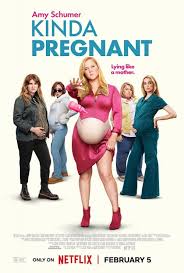
KINDA PREGNANT
US, 2025, 97 minutes, Colour.
Amy Schumer, Will Forte, Jillian Bell, Brianne Howey, Lizze Broadway, Urzila Carlson, Chris Geere, Damon Wayans Jr, Joel David Moore, Jackie Sandler, Duke McLeod.
Directed by Tyler Spindel.
Quite a facetious tone in the title. And, there is quite a lot of facetious humour throughout this comedy (a variation on a romantic comedy). But, with the addition of “pregnant”, there are also some serious themes.
Before venturing on watching Kinda Pregnant, audiences might like to know that it comes from the Happy Maddison Studios, Adam Sandler’s studios, and this is very much a comedy with serious overtones in the popular Adam Sandler style. In fact, Sandler’s wife, Jackie, appears as a yoga instructor. The film is directed by Sandler’s nephew, Tyler Spindel, his previous film for his uncle was The Out-laws.
But this is also an Amy Schumer film, her kind of comedy style, sometimes down and out, often wishful thinking, touches of concern about her appearance.
This time, she is Lainey, seen in the prologue as a little girl playing with her best friend Kate, and the game is giving birth, energetically. Lanie’s main wish is to become a mother. Skip to the present. She and Kate teach in a high school, some precocious brats in the class, of course, discussions about Romeo and Juliet. Lainey is all excited, invited to a dinner, sure that her partner is going to propose, all eagerly psyched up. Actually, he does propose (he is a smug cad) – but not at all what Lainey was hoping for. She goes into a spin.
So, comedy. But, shopping with Kate, Jillian Bell, who is now pregnant, she steals a pregnancy belly from a shop – and, in a range of circumstances, she becomes kinda pregnant. She goes to yoga classes and actually meets a very friendly mother, Megan, Brianne Howie. And who should be Megan’s brother, Josh, but the man she met by chance at a coffee shop and who was kind to her, Will Forte.
So, we can anticipate what is going to happen, when Lainey is at school and not pregnant, and when she is meeting with Megan, even babysitting, attending other classes, and pregnant. There are complications are school, especially with the hard-boiled counsellor, played by stand-up comedian from New Zealand (accent and all) Urzila Carlson, contrasting with the ultramodern and flighty teacher, Shirley, who is pregnant!
So, romance with Josh, complications at school, all coming to a head at a lavish baby shower. And, the continual wondering about how she is going to tell the truth and what will be the consequences.
At times the comedy is very broad, plenty of innuendo, a number of topical cinema and television references, and the satire of a sex scene which moves the censor’s classification from M to MA.
Allowing for all that and depending on one’s mood, there is quite a lot to enjoy.
- The tone of the title? Facetious, ironic? The touch of the serious? This for the style of the film throughout, characters, situations, issues?
- The comedy principally for the female audience? Identifying with characters and situations, pregnancy, birth, children and family? And the role of men and husbands? The different impact for the male audience?
- The production company, Adam Sandler, his style of American comedy, aspects of realism, surrealistic humour, jokes, innuendo, topical references, a succession of episodes and events building up a narrative, the past and the styles of stand-up comedy?
- Amy Schumer and her career, comedy, style, self-image, stand-up comedy?
- The title and the theme of pregnancy, serious admiration for pregnancy and birth, children, the impact for women, those wanting to be pregnant, those not wanting to be pregnant, and the gallery of mothers throughout the film, the central characters, and the women at the yoga and psychology workshops?
- The prologue, Lainey and Kate, playing, giving birth, the conversation, giving ground for their friendship?
- Lainey, in her 40s, at school, Romeo and Juliet, Liam and his crass remarks, Brett and his interventions, Dave and the invitation, expecting the proposal, going to the apartment, the dress, the dinner, the proposal for the threesome, the girlfriend arriving, the cake, her screaming and the scene? Disappointment? And the comic reaction with the class?
- Lainey, disappointed, going for the, coffee trying to avoid Shirley, talking with Josh, bonding, the discovery that he was Megan’s brother, living in the garage, happy in meeting him, the garage, the date, the ice skating rink, his bad experiences, the sexual encounter – and the farcical aspects of the sex sequence? His continued support, the truth and his disappointment? Garage door sequence, trying to persuade him to forgive Lainey? And the scene with the family who would witness the sex as well as other episodes, passing by?
- Kate, married, pregnant, sharing with Lainey, Mark and his seeming disregard and preoccupation? The two working at the school?
- The character of Fallon, New Zealand accent, counsellor, vaping pot, the oddball opinions, her behaviour, lesbian, friendship and advice?
- Shirley, the younger generation, oddball, pregnant, her boyfriend, dancing and 21st-century style? The bond with Fallon, with Kate and the sharing of the baby shower? Antagonism towards Lainey?
- Lainey, shopping with Kate, seeing the baby belly, stealing, pretending to be pregnant, going to the yoga class, the meeting with Megan, Megan friendly, at home with her husband, the young son and his mischievous behaviour? Friendship, the invitation to dinner, the boy with a knife and puncturing the fake pregnancy belly? Lainey always managing despite all kinds of impossible moments, skating, the splits…? Lainey and her loneliness, sadness, desperate for being pregnant? The enjoyment of looking after Megan and Steve’s son, reading to him, the joy of babysitting?
- The psychology class, with Megan, the carry on, the reality and the satire about pregnancy and psychological condition?
- Encounter with Dave, with the girl, seeing her pregnant, her saying triplets, his relief that they were not his? The satire on the callow self-seeking and self gratifying male? Contrast with Mark, absent-minded, yet loving? Steve, the family man, the humour?
- Lainey confiding in Fallon, helping her out, Shirley overhearing, spreading the rumour that Lainey was considering an abortion?
- The lavish baby shower, Shirley and her announcement, Megan and Steve present, Lainey’s speech, admitting the truth, the consequences?
- Lainey back to ordinary, lonely, being present Kate her, Mark present? The news that Megan had had a baby?
- The truth confrontations, the truth for Megan and the reconciliation? And the continued support of Kate?
- And the reconciliation with Josh – and the vehicle, the mad careering and crashing through and the up in the air ending for audiences to speculate on?
Sebastian/ 2024

SEBASTIAN
UK/Finland, 2024, 110 minutes, Colour.
Ruaridh Mollica, Hiftu Quassem, Jonathan Hyde, Ingvar Sigurdsson, Dylan Brady.
Directed by Mikko Mäkelä.
Sebastian is a challenging drama, a British film directed by a Finnish director. Its central character is played by a British/Italian actor, Ruaridh Mollica, with a supporting cast of Scandinavian actors and a strong performance from Jonathan Hyde.
The film is sometimes graphic and explicit in its scenes of sexual encounters.
Max is from Scotland, a talented writer, a short story in the British magazine, Granta, now working on his novel, encouraged by fellow writers with interviews from literary editors. He is highly ambitious for a successful career.
Max is homosexual. He decides to do some research for his writing, setting himself up online as an escort. He meets up with the various men, the sexual encounters, payment. And he begins to write about these encounters, in the third person, his friends and editors not suspecting his activities.
Max creates an online persona for himself, Sebastian, and as the film develops, there is the character of Sebastian, friendly, accommodating, sexually active. But there is also the writing obsessed Max, and the challenge to his two personalities when he encounters a retired writer and editor, Jonathan Hyde, and forms a personal relationship even while observing his behaviour and writing.
Ultimately, some overreaching of himself, criticisms from the friends he lets down, the editors suggesting that the writing is becoming tedious, another encounter with a client which leads to violence and his exposure, stranded in Amsterdam, having to face up to himself, his hopes, some integrity. The audience is not sure that this will happen.
- The title, the working name, Max and Sébastian?
- The London settings, flats, offices, editorial rooms, literature occasions? The contrast with Sebastian’s work, hotels, rooms, clubs? The Amsterdam sequences, clubs, the streets? The musical score?
- The double character drama, the touch of Jekyll and Hyde? Max, his age, Scottish background, family and contact with his mother, his skill in writing, his ambitions, the publication of his story in Granta, further stories and encouragement, the publishing firms and editors and their discussions and encouragement? His friendship with Amna? Her work, comments, affirmation? Acknowledging himself as a gay man?
- Going online, his decision about his story, creating the name of Sebastian, enrolling himself, the photos, the provocative descriptions? His decision to act as an escort rather than just observing? His encounters, the initial encounter with the older man, the relationship with the client, the discussions, the sexual activity, the aftermath? The encounter with Daniel, married, his response to Daniel, Daniel appreciating that he did not lie about himself?
- Seeing him of the typewriter, his creativity, bringing the manuscripts for consideration, the variety of responses, from Amna, editors, the believing he was observing and writing creatively? The shift to writing in the first person, as Sebastian?
- The development of the manuscript, the encouragement of the editors, the publishing plans, the prospect of money, added to the money coming in from the clients? The editors and their criticisms, wanting it more personal, the validity of the criticism that in his becoming more settled as Sebastian, companionship, the audience was losing interest?
- The encounter with Nicholas, literary background, age, manner, teaching, reticent, the gradual relationship? Sebastian and his response, his being changed in this relationship? But still observing? And encountering Nicholas at the literature function? The discussions with Nicholas, about his writing, Nicholas and his encouragement, and Nicholas revealing his story, his literary work, editing, and his long-term relationship, the death of his companion?
- The dilemma for Sebastian/Max, which name to introduce himself with? To continue as an escort? The next meeting with Daniel, the sexual aspects, his reticence, Daniel discovering the truth about him, the violent response? Ousting him, not giving him his wallet, Max wandering the streets, at the bar, the encounter with the young man, asking for money, the young man spitting on him?
- Ringing for the money, his return to England?
- His prospects, the truth about himself, the relationship with Nicholas, the friendship with a, the development of his writing?
September 5
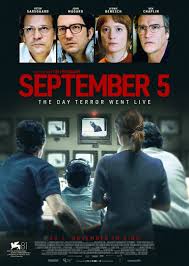
SEPTEMBER 5
Germany/US, 2024, 95 minutes, Colour.
Peter Sarsgaard, John Magaro, Ben Chaplin, Leonie Benesch, Zinedine Soualem, Georgina Rich, Corey Johnson, Marcus Rutherford, Benjamin Walker.
Directed by Tim Fehlbaum.
September 5,1972 was a significant date for terrorism in the 20th century, the Munich Olympic Games, the attack on the Israeli team in the Olympic village, the terrorists, the transition to the airport, the deaths.
The theme was taken up by the American telemovie already in 1976, 21 Hours at Munich with William Holden as the German police chief. Documentary maker, Kevin MacDonald, won the Oscar, 1999, for One Day in September, interviews with many participants, including the last terrorist survivor, Jamal Al Gashey. Steven Spielberg directed a dramatic recreation of the covert operation to eliminate all involved, Munich, 2005.
This film has a different focus, the television media challenged by the events happening in real life and actual time. It is noted that this was the first International satellite linking televising a world event, more people watching the Games than the moon landing three years earlier.
While the drama does focus on the Israeli team, the attack, the terrorists, the tensions, the audience is taken into the ABC production area, the personnel involved, various responsibilities, directing, camera choices, the need for translation from the German for the Americans. Veteran journalist Peter Jennings, his young days, was inside the Olympic village. And the connection was with television host, Jim McKay – and the film using a great deal of footage of his actual commentary.
Focus is on the technical aspects, the cameras, the close proximity to the village, getting cameras into the village, confrontations by the German police not used to this kind of terrorist situation, incoming information, sometimes accurate, ultimately, at first from the airport, not accurate at all, and the responsibility of the executives of what was to go to air or not. And, the initial dilemma, should commercial television be screening live-action killings.
Television reporting footage has developed substantially in the succeeding half-century. But, this is an opportunity to go back, to learn about the past, television possibilities and developments, and, in the light of 21st-century terrorism, especially in Israel, events in the Gaza Strip, Lebanon, to be continually alert.
- The date, 1972, the Munich Olympic Games, the terrorist attack, the disaster, the role of the media, world communication?
- The focus on ABC television, the studio, the technology, the cameras, the editing, the challenge, the first international networking, the studio opposite the Olympic village, the building with the Israeli athletes? The pace of the production work?
- Audience familiarity with the situation, the terrorists, the attack on the Israeli team, the initial deaths, the masked terrorists, the transfer to the airport, the initial hopes, the deaths of everyone?
- The technical effectiveness of this film, the personnel in the studio, the work, times and demands, decisions, positions of cameras, editing and focus, sending the camera personnel out, the police cordons, getting through? Peter Jennings and his position, inside the village, connecting with him? The use of the material from Jim McKay from the time? The connections, his commentary, sense of urgency?
- The importance of Marianne Gebhardt, language, translation, the German experience, memories of the war, the Berlin Olympics, the action, translating, going out and making contacts, reporting in, giving information?
- The key central figures in the studio, Arledge in charge, his presence, decisions, intervening, responsibilities, moral issues, issues for the public and the audience? Geoff, (and the actual Geoff being a producer on this film), experience, having to take responsibilities, the timing, the discussions with Marvin? The issue of filming terrorists killing people on live television? The responsibility to the Israelis, to the public? , His French background, criticisms? The African-American reporter, posing as an athlete, moving in and out with the film? The American national athlete, the interview with his father? Including the interview with the athlete? The pressure on Geoff, succeeding in the programming, his decisions, clash with Marvin, the information that the athletes were safe, then the contrasting news?
- The film not focusing so directly on the athletes, those killed, the terrorists? The glimpses? The situations being described, in the village, the shootings, the uncertainties, to the airport, seemingly safe, and the truth?
- The significance of this film in the 21st-century, 50 years after the events? The extraordinary developments in technology and communication? Subsequent history of the state of Israel, the Palestinians, 50 years of clash, occupation of Gaza, the West Bank?
- The audience with this film and the wide variety of cultural, political, ideological perspectives?
Glassworker, The
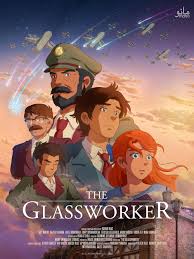
THE GLASSWORKER
Pakistan, 2024, 98 minutes, Colour.
Voices of: Art Malik, Sacha Dhawan, Anjli Mohindra, Tony Jayawardena, Teresa Gallagher.
Directed by Usman Riaz.
The Glassworker is the first animated film from Pakistan. And it has hand painted animation rather than CGI. And, it has a debt to the styles of Japanese anime.
The film focuses on a father and son, the father and expert class blower, instructing his son, homeschooling, confidence in his son’s talent and artistic imagination, derived from his now deceased mother. So, many beautiful sequences of glass blowing, glassmaking, finished products.
The young son, Vincent, is spurned by the local boys, encounters a young girl who comes into his shop, the various ups and downs of the relationship, especially with the theme of war, rather vividly portrayed by the animation, Vincent’s father a pacifist, looked down on by the militant population, admiring the general in charge. The young girl emerging as his daughter.
Over the years, friendship, misunderstandings, the daughter a talented violinist, inviting Vincent to her recital but his being prevented entry by prejudiced guards. Later, the adult Vincent has an exhibition of his glass artwork in the city – and an imaginative meeting again with his lost love.
The Director, Usman Riaz, co-wrote the screenplay and also composed the quietly plaintiff score.
- Title, audience fascination with glassblowing, the process, the quality of the sand (and the beach nearby), the fire, the blowing, the moulding, the cover? The finished products and their beauty?
- The style of the animation, and drawings, the different characters, the settings, the home and the glassblowing, town, the buildings, the cliff and the sea, the cave? The tone and melodies and orchestrations of the score?
- The vividness of the war sequences, the military, parades, fighting, the plains, the bombs, the devastation, the fires?
- Thomas Oliver, the glassblower, the story of meeting his wife, her talent, her death? Living with his son, Vincent, a young boy, learning the trade, his skills, his imagination, the various objects created? The bond between father and son,, keeping him at home, boy wanting to be at school, is ridiculed by the others? The years passing, the talent?
- The moving between times, the adult Vincent, relationship with his father, his father support, the plan for the exposition, the planning of the program?
- The encounter with Alliz, in the shop, his dropping the flower, her saving it, the beginning of the bond between them, her mother taking her away, the military parade, and the carriage, her father the military commander? A character, going to the boarding school, her talent with the violin, the fellow student carrying the instrument everywhere, the boys and their attention? Her skill at playing, the teachers?
- The war, the parade, Thomas and his shouting, his pacifism, reputation the town, Vincent suffering? The confrontation, the threats to take Vincent away, his collaborating with the glassware for the war effort, the bombardments? Father and son working together? Vincent, a crisis, his emotions, tampering with the products, the lowering of the chests to the shore, his father’s reaction, lifting they carton, losing his arm? The repercussions for Vincent?
- Later, the meetings with Alliz, he showing her the glassblowing, his father ordering her out? The meetings, the conversations, the gift, Vincent’s comment that she needed inspiration for her out?
- Allize and her success, the recital, the invitation, Vincent dressing up, being held up by the prejudiced guard, losing the invitation, not being admitted, on the roof, hearing her performance? In honour of her father, his being rescued, the flashbacks to the military action, the young man and his heroics, the father being saved, kissing the young man, Vincent upset?
- The adult Vincent, his exposition, the quality of the artwork, his father speech, the admiration of the crowds?
- The finale, the style, the aspects of magical realism and the Magic presence? The beach, Alliz and her reappearance?
Sing Sing
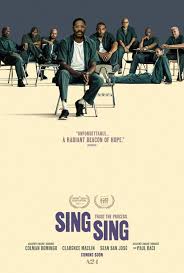
SING SING
US, 2023, 107 minutes, Colour.
Coleman Domingo, Clarence Maclin, Sean San Jose, Paul Raci.
Directed by Greg Kwedar.
Sing Sing is one of the United States most well-known prisoners, in upstate New York, on the Hudson River. And it featured in early films, 20,000 years at Sing Sing with Spencer Tracy and Bette Davis in the 1930s and subsequent locations for various prison thrillers.
This is not that kind of film.
For some time at Sing Sing, there was a program RTA, Rehabilitation through the Arts. This Is what this film Is about, a focus on the prisoners themselves, their response to Theatre, the effect on them personally, for morale in the prison. It was based on an article of 2005 in Esq magazine, written by John Whitfield who is the central character of this film. (In 2005 there was a documentary, set in California, Shakespeare Behind Bars, with the same theme.)
Of course, there are some scenes in the yard, the sudden siren and prisoners having to prostrate themselves, some focus on the cells some harassment of guards ransacking belongings in cells… But, the perspective of this film is very positive.
The principal feature is the fact that most of the cast consists of actual prisoners from the past or the present, re-acting what they lived through with this theatre rehabilitation. On face value, literally, they don’t seem likely candidates for drama but tough, one with a tattooed face, mainly African-Americans, in fact. They enter into this film with great zest, the discussions, exploring their characters, discussing whether to put on comedy or drama, finally opting for comedy.
But, at the centre, is the character of Whitfield himself, wrongly convicted, long time in prison, turned down by parole boards, but writing creatively, plays for the prisoners, part of the steering committee for the theatre group, coaching, acting. And along with him is the director, who comes from outside, long time working with the prisoners, writing the plays, some powerful scenes where he trains them, directs them in movement, has some quietly closing their eyes, contemplating memories of a friend, encourage and to express what they have seen and felt.
There are two other prisoner characters, a great friend of Whitfield, following him around, full of enthusiasm and suggestions. His played by an actor, Sean San Jose. The other principal character is the former prisoner, Clarence Maclin, replaying his own experiences, drug dealing in the yard, any demands from the dealer, it interested in the theatre, initial clashes with Whitfield but forming a bond, the audience understanding the impact of the rehabilitation through watching him, his Hamlet soliloquy, the director urging him to intensity, his moods, his developing a relationship with Whitfield, support for him when Whitfield breaks after an interview with the parole board.
Colman Domingo has won many awards for his portrayal of Whitfield, many nominations including Golden Globe and Oscar. For this reviewer, the film could have been longer, more development of the prisoner characters in themselves, more scenes of rehearsals and performance. But, Domingo holds it together on the whole project is, of course, a most worthy cause.
- Audience knowledge of Sing Sing, prison, history, eye security, guards and administration? This film’s focus on the group of prisoners, and the work of Rehabilitation through the Arts?
- The views of the prison, outside, the Hudson, trains? Inside, the yards, the cells, rehearsal rooms, theatre? Musical score, final song?
- Nominations for awards, Coleman Domingo’s performance, the professional members of the cast, most of the cast as former prisoners, prisoners, reliving their experiences?
- The atmosphere of the prison, comparative freedom for the theatre group? Scenes in the cells, sharing, discussions, conditions? Harassment of the prisoners, sirens and falling to the ground in the yard, visiting the cells and wrapping them up…?
- The film based on the reality of the Rehabilitation for the Arts, John Whitfield's article Esq, 2005? His story? Long years in prison, meetings with the Parole Board, the focal meeting, the documents, the accusations, the lack of evidence, the crime, his innocence, the phone call to his mother? His children? His career in writing, the players, the performances?
- The introduction to the range of prisons, their appearance, characters, actual prisons and experience, the use of their audition videos in the film? Their interest in theatre, the discussions, the steering committee, discussion about drama or comedy, the interchanges, the initial visuals of their performance at the credits, the audience interest in what they could achieve?
- The director, his working with the group, his personality, encouragement, they’re welcoming him? The discussion about the play, the comedy, the range of ideas, from Hamlet to Freddy Krueger, his going away, writing a text, bring it to them, their responses? The scenes of him training them, walking, shooting their eyes and imagining, communicating their images?
- Clarence Maclin, in the yard, the drugs, the young man, the bad drugs, $500? His relationship with Whitfield? The nicknames of Divine? The gradual bonding, the discussions, the issue of Hamlet’s soliloquy? Macon and his attitudes, with the group, surly, gradually harmonising, succeeding, his encouragement to be intense with the soliloquy? The later scenes, the discussions with Whitfield, sitting with him, supporting him, helping Whitfield come out of himself? Final performances?
- The character of Mike Mike, professional actor, sharing with Whitfield, their discussions, following him round, ideas, creativity, his loss with the group, their response?
- Whitfield, his character, strengths, moments of depression, intervening, encouraging? The bond with Mike Mike? With Maclin? The impact of the board meeting? The documents, Maclin and his being able to leave?
- The rehearsals, the costumes, performance, happiness, the absurdity of the play, the women coming in for their roles? The director? Whitfield and his interruption, disastrous, the reactions?
- Whitfield persuaded to come back, the performance, the success – and the collage of sequences, especially drawing on those from the actual past?
- Whitfield, quiet, reflecting, his leaving, meeting with Maclin, the exhilaration of freedom?
Julie Keeps Quiet
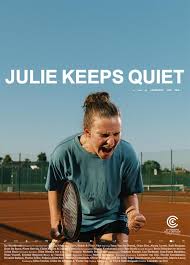
JULIE KEEPS QUIET
Belgium, 2024, 100 minutes, Colour.
Tessa Van den Broek, Grace Biot, Noah Leclloux, Claire Bodson, Pierre Gervais..
Directed by Leonardo Van Dijl.
A significantly topical theme.
In recent years, issues have been raised about the relationship between sports coaches and their athletes, especially inappropriate behaviour, even harassment and abuse. This film takes of this theme in the context of a high school and specialist training for a tennis star.
The duly of the title is a teenager, working hard at school, popular with the other students, conscientious about her work. She is completely dedicated to tennis, training and exercise, with hopes for future selection. However, she has her quiet and taciturn moments.
The film has a great number of tennis sequences, tennis practice, exercises, immersing the audience in Julie’s world of horizons.
But, an investigation has been raised about her former coach. There are meetings with the head of the Department, discussions with her parents, but Julie being reticent. She also meets up with the former coach with there is the revelation as he explains to her that he stopped when she asked him to stop.
There is tension with the new coach, her wariness, but a gradual acceptance of him. There is the complication that one of her previous coaches students committed suicide.
This is a film of the emotions and talk rather than any explicit sequences of flashbacks, focusing on the investigation, the behaviour of the coach, the response of the students and the effect on Julie.
- The topical theme? Athletes, trainers, relationships, behaviour, harassment, abuse? The Belgian setting, universal? The school, classrooms, the tennis courts, practice, competition? Classes, schoolfriends, travel for tournaments? The tennis atmosphere?
- The significance of tennis, the impact for tennis fans, non-tennis fans, the initial practice, the focus on Julie, the ball, her returns, serving, multi-courts and the players, the coaches, the spectators, in the background of physical exercises – even to the final credits and Julie’s final push-ups and at rest? The musical score?
- Julie, her age, seeing her first tennis, sing her with her parents, her father support, the role of Jeremy, his coaching her, encouragement, his seeing her talent and possibilities, his withdrawal, the discussions with the head, the issues of the investigation, her seeming to ignore them, her clashes with the new coach, gradually accepting him, his highlighting her with the others, her serve? The trouble to the tournament, successful, the relationship with the other students? In as and her rich family and demanding refunds? Laura and the confidentiality? And the story of the suicide and suspicions concerning Jeremy?
- The management, the meetings, the discussions, the investigation, Jeremy suspended?
- Julie meeting with Jeremy, her relying on him, his skill in coaching, his ambitions for her, the details of advice, the revelation of the relationship and his stating that he stopped when Julie asked him to stop? The repercussions of this experience for her? And the story of Aileen, her promise, Jeremy, her death?
- The portrait of the youngsters, in class, tennis, their friendships, discussions?
- The title, the focus on the victim, not wanting to communicate, self-isolation? And the need for further steps?
Sad Jokes
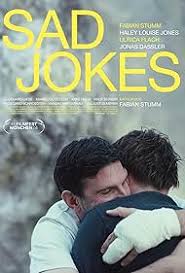
SAD JOKES
Germany, 2024, 96 minutes, Colour.
Fabian Stumm, Hayley Louise Jones, Justus Meyer, Ulrica Flach, Jonas Dassler.
Directed by Fabian Stumm.
Sad jokes is an evocative title, especially when the first few minutes of the film offering a range of characters telling said jokes, corny jokes, pun jokes.
But, this is a story of Joseph, and gay filmmaker, played by Fabian Stumm who has written, directed, starred in this film. After the success of his first film, he has discussions with the producer about making a comedy, the producer somewhat sceptical, asking what kind of comedy, Joseph floundering – but, this film itself probably the equivalent of what he was proposing, sadness and humour.
Joseph his co-raising a little boy, the son of Sonya, prone to depression and spending time in institutions. But Joseph relishes his time as the boy’s father and bonds with him. There are some neighbours, characters, who support him in trying to help Sonya. Sonya has some vivid scenes, frantic in the kitchen, going back to the institution, but emerging and a powerful sequence where she relates a therapy experience in imagining and telling a story, indicating hopes for the future.
Which means that this is a different kind of domestic comedy with serious overtones. And, probably reflecting some of the experiences of Fabian Stumm in his filmmaking career.
- The title, the comedy aspects, the same human aspects? In the opening with the range of jokes told and audience response? The mood?
- The German setting, German humour, German sadness?
- Joseph’s story, Fabian Stumm and his writing, performing, directing? Character and personality, gay man, breaking up with the partner, the later encounter and their conversation, his partner moving on? His relationship with Sonja? Her pregnancy, the birth of the boy? The Platonic relationship, bringing up the boy together? His happiness in being a father? The scenes together? His work as a filmmaker, his success, the discussions with his producer, discussions about the film is set in filmmaking, the prospects for the future, his wanting to do a comedy, the producer asking what kind of comedy, his presenting the manuscript, the producer not finding it funny?
- This film itself is the equivalent of Joseph’s proposal for the comedy, idiosyncratic humour, serious themes?
- Sonia, the depression, in the institution, getting out, at home, frantic behaviour, the cooking, with her son, Connie and Alice and their supporting Joseph? Her going back to the institution? The later visit, karma, her April to discuss the situation, the telling the story of the therapy, imagining the situation, open to change?
- The neighbours, Connie and Alice, characters, the subplot of their lives, their support for Joseph?
- The boy, his age, with each of his parents, his situation, vitality?
- Joseph, the art class, the men posing, the later contact, the message, Joseph responding, it is tension, the man moving off?
- Joseph and the success of this film, the prospects for future film? And the prospects of his life, a combination of sadness and jokes?
Flight Risk
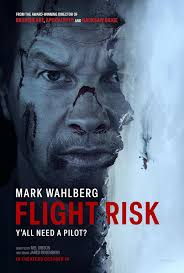
FLIGHT RISK
US, 2025, 91 minutes, Colour.
Michelle Dockery, Topher Grace, Mark Wahlberg, Maaz Ali, Paul Ben-Victor.
Directed by Mel Gibson.
Best to consider first the issue of Mel Gibson, his reputation, personal, as a filmmaker. Many audiences react against Mel Gibson because of his strong views, his anti-Semitic outbursts in the past. (Catholic audiences are probably dismayed by his extreme views about the church, tradition, the inheritance from his father’s Conservative stances but will still go to see and even enjoy his films!).
In fact, Mel Gibson is an Oscar-winning director with Braveheart. He also directed Apocalypto and Hacksaw Ridge which have strong reputations. And, of course, there is The Passion of the Christ.
This 90 minute action show is a long way from these films. Gibson said he wanted to make it for sheer entertainment and that is what it offers. It is reminiscent of a number of films but that is the nature of the popular action show.
While Mark Wahlberg has top billing, above the title, the main strength of the film is with Michelle Dockery, Madolyn, taking some time off from Downton Abbey. She is an officer who has allowed someone to die on her watch and has been suspended, given the opportunity for rehabilitation, going to Alaska to apprehend a key witness against a violent financial criminal. The witness is Winston, played by Topher Grace, a timid desk person but shrewd in his management of money, incessantly chatty, but with the possibility of some kind of redemption and witness protection.
The bulk of the film takes place in the air during a flight across Alaska to Anchorage. Mark Wahlberg plays the good old boy pilot, even having the top of his head shaved which makes him seem more eerie! And, it very quickly emerges that he is not what he seems and, in fact, is a hired killer.
Which means then that there are lots of complications during the flight, guns, knives, but, especially, effective tasering. The plane is rickety, the mountain peaks ominously looming, Madolyn having to fly the plane, on automatic, getting guidance from an official who is flirtatious while giving his advice. Then there is the question of a leak in the department, suspicion on Madolyn’s contact, on her boss, and the taunts of the hitman pilot.
And, there is always the excitement of the crash landing.
Most entertainment action films are made up of elements that we are familiar with but with some variations. Same here.
- Expectations of Mel Gibson film? Of an action film? Action in the plane?
- The Alaskan settings, the town, the mountains, the city, the tarmac…? The musical score?
- Situation, Winston, his background, accounting, doing deals for criminals, under threat? Hiding in Alaska? His personality, chatter, his mother, fearful? Wanted as a witness?
- Madolyn, her history, the person killed under her watch, suspended, invited back, determined, the confrontation with Winston, taking him in? The plane flight to New York? Her contact with Janine through phone? Some suspicions of her? Contact with Coleridge the boss? The discovery of the truth? The ruthlessness, Janine’s death?
- The plane, the pilot, Mark Wahlberg, jovial old boy, the bald head? The chatter, the blood? Madolyn realising the truth, pulling the gun, the struggle, Tasering him? The reality of his being a hit man, knowing all about her, taunting her? The fights, tying him up, the spectacles, cutting loose? His personality, taunting?
- The pilot loose, the fight, Winston and the knife, his being stabbed?
- Madolyn, using her wits, strength, talking with Winston, the threats to him, untying him? The personal story, his mother? Autopilot? Talking with Janine, talking with Coleridge? The discussions with Hasan, jovial, flirting, his helping her land?
- The dramatic issues, the fights, the mountains, fuel diminishing, the landing, the wind, the crashing, the pilot thrown out, run over by the vehicle?
- Landing, the hospital for Winston, her meeting Hasan? The threats by Coleridge, her recording them? Vindication?
Den of Thieves: Pantera
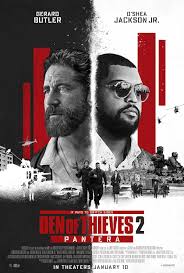
DEN OF THIEVES 2: PANTERA
US, 2025, 130 minutes, Colour.
Gerard Butler, O'Shea Jackson Jr,Evin Ahmad, Salvatore Esposito.
Directed by Christian Gudegast.
In 2018 audiences enjoyed Den of Thieves, the pairing of O’Shea Jackson Jr (son of Ice Cube) and Gerard Butler, one criminal, one police, all kinds of intrigues and manoeuvres, involvement in elaborately planned robberies.
So, here is an opportunity to revisit, relive the enjoyment of the first film and more elaborate robberies and setups.
This time the focus is on Donnie, O’Shea Jackson Jr, not necessarily learning from the results of the first film, involved in quite an elaborate heist. And, quite some accomplices, especially the mastermind, Jovanna (Evin Ahmad), cool and controlling. Donnie is involved in all kinds of intrigues, especially on the French Riviera Coast, trying to do deals with the stolen diamonds. However, there is one special red diamond that is coveted by the Pantera capo.
Into the action comes Big Nick, Gerard Butler, who did battle with Donnie in the first film. But, here it seems some kind of collaboration, Nick being very easy-going, interested in the manoeuvres, getting involved in all kinds of action, but…
A very international atmosphere, especially on the French Riviera, Nice and the surrounding mountains, especially chases and ambushes on the mountain roads, action, betrayals, comeuppances…
More or less what the audience revisiting Den of Thieves was expecting.
- The popularity of the original film? The title and tone, thieves and schemes, police and investigation? Tough action? A sequel, continuation with the characters, presupposing audience knowledge of the first film?
- The title, the Italian Mafia, Pantera? Control, vengeance, gangs? And the finale with the capo?
- The focus on Donnie, the initial raid, the robbery, the diamonds, the red diamond? Donnie and his personality, passing himself off as an expert, Nigerian? His American background? The participation in the robbery, in the schemes, moving from identity to identity?
- Jovanna, the flight attendant disguise, the control, the technology, computers, surveillance? Her role with the game? Deals?
- Donnie, in France, the coast, the expert, playing up to her, her expectations? Personality?
- Nick, Gerard Butler, personality, the first film, interactions with Donnie, coming to Europe, becoming part of the gang, his credibility, in action, nonchalant, suspicious?
- The complications, the betrayals, the Pantera, the Independent types, the Eastern Europeans? Meetings, betrayals, action?
- Nick, shrewd, his activities, dangers, with Donnie, his manoeuvres?
- The buildup, the confrontations, the chases through the mountains, the ambushes, the deaths?
- Nick, undercover, leading the group on, informing the police in Nice, the link there, the arrests?
- And Donnie going to the capo – embraced and the possibilities for further Den of Thieves action movies?
We Live in Time
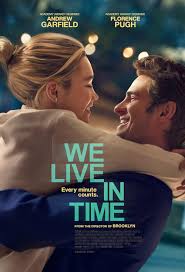
WE LIVE IN TIME
UK, 2024, 108 minutes, Colour.
Andrew Garfield, Florence Pugh, Grace Delaney, Lee Braithwaite, Adam James, Douglas Hodge, Niamh Cusack.
Directed by John Crowley.
We live in time, moment by moment, day by day, year by year, a linear progress. But, in time, we also have the capacity for moving backwards and forwards in our memories.
It is important to note this for this film because rather than the linear progress of a couple meeting, falling in love, having a child, coping with illness, the screenplay moves backwards and forwards, sometimes disconcerting, the audience having to be alert to appreciate at which period in time the action is taking place. Which means that the experience for the audience is not immersive as a linear exposition would offer, but, rather, a variety of responses as we move backwards and forwards in time for insights and comparisons.
And, with living in time meaning from birth to death, this film is very strong in an unusual and sometimes graphic (but happy) birth sequence as well as a contemplation of illness and death.
The film was directed by John Crowley (Brooklyn, The Goldfinch) and gives strong opportunities for performance by the two stars. Andrew Garfield is Tobias, working with Weetabix and its promotion, a strong presence but designed very much to be supportive of Florence Pugh as Almut who, in fact, knocks him down in her car, not the most propitious of meetings. In fact, this is very much Florence Pugh’s film, a strong screen presence as has been shown in a range of films, comedies, dramas and even Marvel Universe actioners, dominating the film, her personality, her moods, her skills as a chef, her pregnancy and the challenge of the birth, her love for her daughter, her having to face serious cancer.
With moving backwards and forwards in time, we do have the opportunity to appreciate Almut’s response to her illness in the light of her previous activities, approaches to life. And, while she is fully alive with her husband and child, her skills as a cook, a chef, are significant, propelling her, even as she is sick, to join in the UK tea, in a chef’s competition in Italy.
The film has a strong female sensibility (though written and directed by men), inviting an empathy with Almut, not always liking her, irritated sometimes with her, but also in admiration of how she deals with life and life challenging situations.
- The title, the focus on time, but not in linear time for the narrative, moving about in time, and themes of time from birth to death?
- The British film, locations, characters, issues? The London sequences, the home and interiors, the grounds? The Italian sequences, the travel, the chef competition? The musical score?
- The effect of the narrative being non-linear, audiences jolted, identifying the time situation? The role of memory, memories and interpretation, understandings of the past? Preparing for the future?
- The bond between Tobias and It? The initial encounter, Tobias and the divorce, upset, being hit by the car, in hospital, the initial encounter with Helmet? Explanations? Each personality? Tobias, the impact of the divorce? Helmet, her parents, the story, skating, family life? As a chef? Seeing her at work, the kitchen, the staff, creativity, with Jade?
- The development of the relationship, Tobias, his work, manner, the meetings with helmet, wanting to depend, time passing, falling in love, the ring in proposal? The bonding together? Families? The issue of children, the disputes?
- The backwards and forwards, the issue of helmets illness, the past, recovery, the recurrence, the effect on her, the consultations, the advice, medical treatment? Success? Failure? Her work, the decision to continue with the cooking, the effect on her, being sick, the issue of the hysterectomy?
- The pregnancy, her working, the effect? Tobias and anxiety? Held up in the traffic, the service station, the attendance, the drama and comedy of the birth? Success?
- The scenes of happy family, their daughter, the playful sequences, the outings? The effect on each of them?
- The decision to carry on with the cooking, the background of her success at the restaurant, Simon and his urging, choosing Jade? The clash with Tobias, his challenges to her, her response, wanting something that her daughter could remember her by? Change of heart, the winning of the UK session, going to Italy, Tobias and the daughter supporting her?
- The symbolic skating, her past championship, Tobias awkward?
- Her death, Tobias and his daughter returning home, the dog, the chicken coop, memories of the past, how to crack eggs?